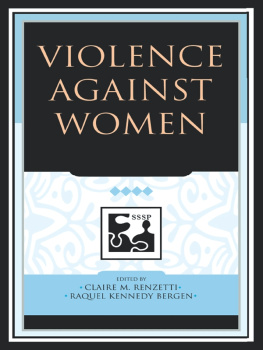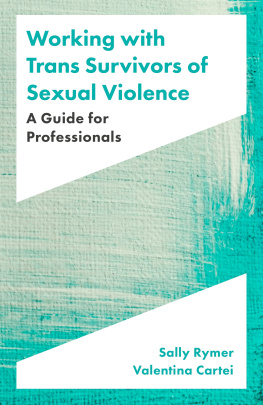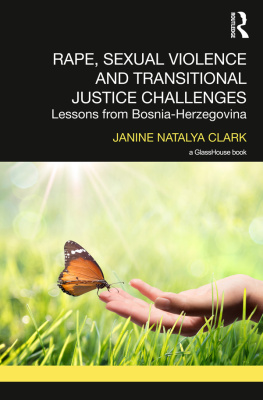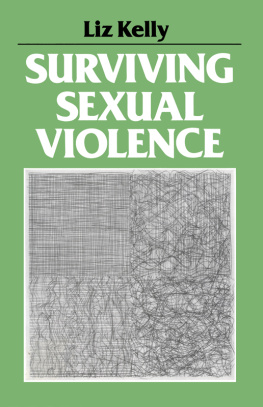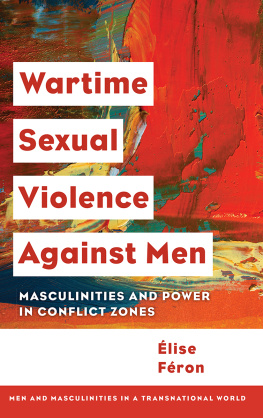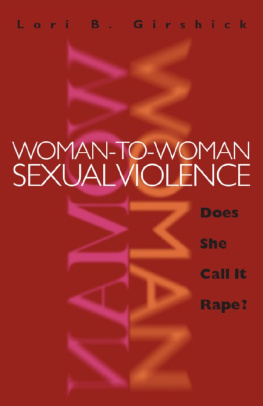Liz Kelly - Surviving Sexual Violence
Here you can read online Liz Kelly - Surviving Sexual Violence full text of the book (entire story) in english for free. Download pdf and epub, get meaning, cover and reviews about this ebook. year: 2013, publisher: Polity, genre: Home and family. Description of the work, (preface) as well as reviews are available. Best literature library LitArk.com created for fans of good reading and offers a wide selection of genres:
Romance novel
Science fiction
Adventure
Detective
Science
History
Home and family
Prose
Art
Politics
Computer
Non-fiction
Religion
Business
Children
Humor
Choose a favorite category and find really read worthwhile books. Enjoy immersion in the world of imagination, feel the emotions of the characters or learn something new for yourself, make an fascinating discovery.

- Book:Surviving Sexual Violence
- Author:
- Publisher:Polity
- Genre:
- Year:2013
- Rating:5 / 5
- Favourites:Add to favourites
- Your mark:
- 100
- 1
- 2
- 3
- 4
- 5
Surviving Sexual Violence: summary, description and annotation
We offer to read an annotation, description, summary or preface (depends on what the author of the book "Surviving Sexual Violence" wrote himself). If you haven't found the necessary information about the book — write in the comments, we will try to find it.
Surviving Sexual Violence — read online for free the complete book (whole text) full work
Below is the text of the book, divided by pages. System saving the place of the last page read, allows you to conveniently read the book "Surviving Sexual Violence" online for free, without having to search again every time where you left off. Put a bookmark, and you can go to the page where you finished reading at any time.
Font size:
Interval:
Bookmark:
Copyright Liz Kelly 1988
First published 1988 by Polity Press
in association with Basil Blackwell.
Editorial Office:
Polity Press, Dales Brewery, Gwydir Street,
Cambridge CB1 2LJ, UK
Basil Blackwell Ltd
108 Cowley Road, Oxford OX4 1JF, UK
All rights reserved. Except for the quotation of short passages for the purposes of criticism and review, no part of this publication may be reproduced, stored in a retrieval system, or transmitted, in any form or by any means, electronic, mechanical, photocopying, recording or otherwise, without the prior permission of the publisher.
Except in the United States of America, this book is sold subject to the condition that it shall not, by way of trade or otherwise, be lent, resold, hired out, or otherwise circulated without the publishers prior consent in any form of binding or cover other than that in which it is published and without a similar condition including this condition being imposed on the subsequent purchaser.
British Library Cataloguing in Publication Data Kelly, Liz
Surviving sexual violence.(Feminist perspectives).
1. England. Sex offences
I. Title II. Series
364.1530942
ISBN: 978-0-7456-6743-0 (Multi-user ebook)
Typeset in 10 on 12pt Plantin by Cambrian Typesetters
Printed and bound in Great Britain by
Marston Lindsay Ross International Ltd,
Oxfordshire
Whilst breaking the silence has become a feminist clich in the past few years, it encapsulates an important fact. Feminism has provided a context in which many women, throughout the world, have been enabled to name their experiences of violence and abuse and to speak openly about them. This book was made possible by 60 women who chose to be part of this process. It is dedicated to them and all survivors of sexual violence.
As with any book and/or research project, there are many others to whom I am in debt for their support, advice and critical comments. I thank all of the following for their particular contributions: Catriona Blake, Louise Dunne, Annabel Farraday, Sophie Laws, Su Kappeler, Emma Kelly, Mick Kelly, Mary Macintosh, George Okey, Kathy Parker, Jill Radford, Isobel Ros-Lopez, Penny Snelling, Betsy Stanko, Michelle Stanworth, Marga Suvaal, my local refuge support group, the British Sociological Association working group for women doing research on sexual violence, the Incest Survivors Campaign, the Rape in Marriage Campaign, and the Trouble and Strife Collective.
Whilst transcribing the taped interviews on which this book is based I became aware of problems involved in transposing the spoken to the written word. Meaning in the spoken word is often conveyed through gesture, tone of voice and emotional expression. Surprisingly little attention has been paid to this issue in the research literature; the methods used in linguistics and conversational analysis are far too detailed for a number of in-depth interviews (in this case over 160 hours of tape). In order to retain some of the meaning that is lost in transcription, I developed a method for coding tone of voice and emotional expression. This guide explains aspects of this transcription coding which appear in the quotations from interviews:
A dash () indicates a jump; the spoken word is seldom as coherent as the written.
Three dots () indicate a passage of speech has been deleted.
Six dots () indicate a long pause.
Italics indicate that the word or words were stressed.
Emotional expression is recorded in brackets after the passage of speech it refers to: for example (angry), (ironic), (upset).
As I was thinking about the introduction to this book, two statements on the radio drew my attention. A woman speaker at the 1986 British Trade Union Congress urged trade unionists to take the epidemic of cervical cancer seriously. In a commentary on international terrorism a male reporter stated that something must be done about the plague of violence that threatens our basic human rights. When the incidence of cervical cancer is defined as an epidemic, what word could adequately reflect the vastly greater incidence of sexual violence in the lives of British women? When the impact of international terrorism is represented as a threat to basic human rights, what words could illuminate the fact that it is domestic terrorism which more directly threatens countless womens lives across the globe?
These examples do not simply illustrate the power of rhetorical speech. They highlight a deeper, more fundamental point: that it is only in relation to certain issues that such forms of argument are considered to be justified. When radical feminists point to the appalling incidence of sexual violence we are seen by many as hysterical and, even by other feminists, as placing too much emphasis on womens victimization. Most men and many women do not want to acknowledge the extent of sexual violence in, and its impact on, womens lives. It is still illegitimate for us to refer to it as being of epidemic proportions, threatening womens basic human rights. Yet a cursory reading of the UN Declaration on Human Rights in the light of recent feminist studies of the prevalence and impact of sexual violence highlights how many of these basic human rights are still to be secured for women.
Surviving Sexual Violence is part of a growing body of feminist scholarship, primarily undertaken in but not restricted to first world liberal democracies, which documents the extent to which womens and girls rights to life and liberty are threatened daily. That such a fundamental assumption of liberal democracy is tenuous for the majority of the population yet not a major source of concern, suggests that there are vested interests at stake here mens interests.
During the six months I was writing this book, a number of instances, or consequences of, sexual violence occurred to women in my social network: for example, an incest survivor attempted suicide twice in a week after a BBC Television Childwatch programme triggered her memories; a womans life was temporarily devastated when her ex-husband raped her; two women were attacked near to their homes; a students sense of safety was so undermined by a peeping tom that she left college; an incest survivor discovered her sons girlfriend was being abused; during rag week, a woman teacher was pinned to the ground by several young men in masks and then photographed; three women were beaten up by their husbands/male lovers and, in just one week, in the refuge for battered women I work in one woman had a miscarriage and another her leg amputated as direct consequences of the violence they had experienced.
Despite feminist campaigns and actions in many countries which have, to a greater or lesser extent, made sexual violence a public issue, the prevalence and impact of sexual violence in womens lives is still not publicly acknowledged. In this context it is vital that the extent and range of sexual violence continues to be documented. Limiting our work to this, however, can result in women being seen as inevitable victims. This book also records the other side of womens experiences: our resistance and strength in coping with and surviving abuse. Any woman who has gone through this process (and any woman who has supported another woman through the pain and despairing moments) will recognize the connection between victimization and survival. This book attempts to validate that knowledge and make some of it accessible to those without it.
Surviving Sexual Violence is based on a feminist sociological research project and has two basic aims: to present the findings of the study; and to validate and give voice to womens experience and understanding.
Font size:
Interval:
Bookmark:
Similar books «Surviving Sexual Violence»
Look at similar books to Surviving Sexual Violence. We have selected literature similar in name and meaning in the hope of providing readers with more options to find new, interesting, not yet read works.
Discussion, reviews of the book Surviving Sexual Violence and just readers' own opinions. Leave your comments, write what you think about the work, its meaning or the main characters. Specify what exactly you liked and what you didn't like, and why you think so.


